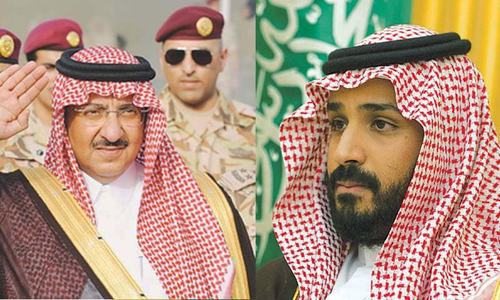Saudi Arabia's hard-charging Deputy Crown Prince Mohammed bin Salman holds unusual power for a man of just 30, so much so that diplomats have nicknamed him "Mr Everything".
Set to announce Monday a major programme to restructure the kingdom's oil-dependent economy, the son of King Salman has risen to among Saudi Arabia's most influential figures since being named second-in-line to the throne last year.
Prince Mohammed, seen as the standard-bearer for a new generation of Saudi royals, is in charge not only of the country's economic policy but also the military as defence minister.
The prince has amassed "extraordinary power and influence very quickly" since his father took the throne last year after the death of King Abdullah, said Frederic Wehrey of the Carnegie Endowment for International Peace in Washington.
"He's clearly very bright, very intelligent, very on top of all his briefs" and has significant influence on the 80-year-old monarch, one Western diplomat said.
Among his key positions is as chair of the Council of Economic and Development Affairs, set up last year to oversee the economy. Mohammed also chairs a body overseeing state oil giant Saudi Aramco.
As defence minister the prince has spearheaded the kingdom's military intervention in Yemen, where a Saudi-led coalition 13 months ago launched air strikes against Iran-backed rebels in support of the embattled government.
In a profile and interview released earlier this month, Bloomberg Businessweek said the prince works 16-hour days and draws inspiration from the writings of Winston Churchill and Sun Tzu's "The Art of War".
It was the latest interview in which the prince has spoken at length about economic plans for the kingdom, where officials are traditionally tight-lipped.
A law graduate from Riyadh's King Saud University, the dark-bearded prince with a receding hairline is the father of two boys and two girls and ─ unlike other members of the royal family ─ has only married once.
He told Bloomberg that modern life does not leave the time for multiple marriages.
While Mohammed has been careful not to challenge Saudi Arabia's conservative traditions and powerful clerics, some in the country hope he will be a social reformer.
Mohammed spent years working for his father when he was governor of Riyadh and from 2013 after Salman was named crown prince.
"He has a reputation for being aggressive and ambitious," Bruce Riedel, a former Central Intelligence Agency officer who directs the Brookings Intelligence Project in Washington, has said.
His relationships with other members of the royal court are unclear and observers last year pointed to an emerging power struggle between Prince Mohammed and Crown Prince Mohammed bin Nayef, 56, the interior minister and first-in-line to the throne.













































